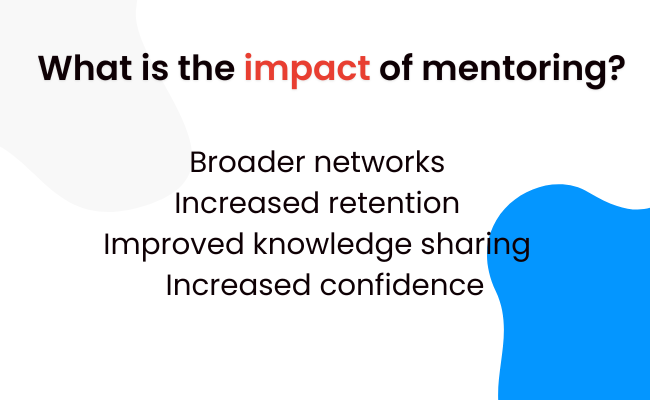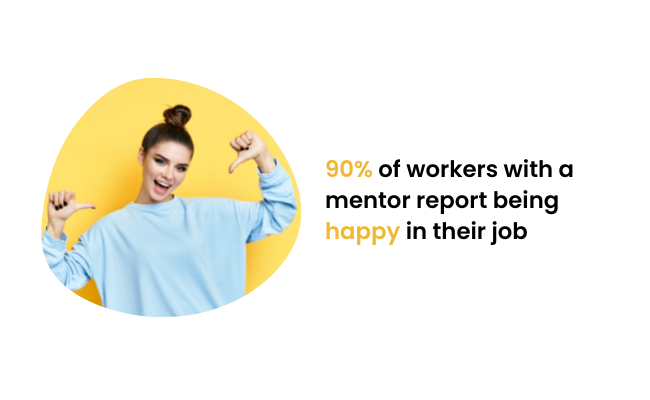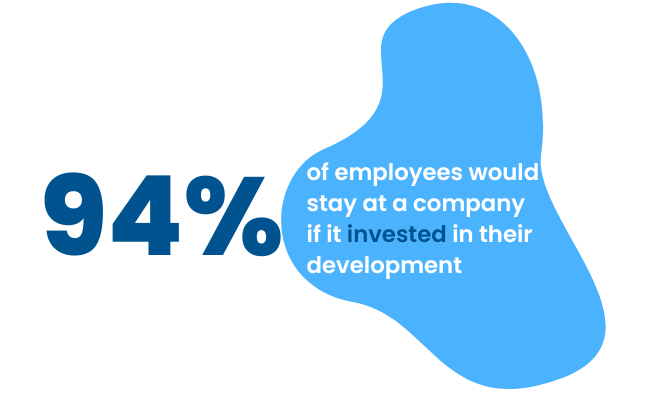
If you want a workplace mentoring programme, then you’re in the right place. Here’s 5 easy steps on how to get started.
The benefits of a mentoring programme are wide-reaching. Not only does it impact your mentees, but the mentors and the business will see an impact too.
In fact, 90% of workers who have a mentor report being happy in their job.
So, from a job satisfaction perspective alone, you can see the impact a mentor can have.
And when 71% of Fortune 500 companies use a mentoring program, it’s clear that big businesses rate it too.
But how do you create a good mentoring programme? That’s where we come in.
In this blog, we’ll go through:
- What a mentoring programme is
- Why you should consider a mentoring programme
- What the benefits of a mentoring programme are
- How to start a mentoring programme
So, let’s get started.
What is a mentoring programme?
A mentoring programme, or mentorship, typically supports new hires or those early in their careers with expert advice and skills from more seasoned employees.
Related: Read our complete guide to mentoring
In some cases, the mentor might be an external figure too.
Mentoring involves breaking down what the mentee is looking to learn and develop, and then matching them with an appropriate mentee.
It can help mentees learn more about their role, or their industry. Or, it could be in place to help them develop soft skills that are separate to their role.
🚀 Pro Tip
A lot of our healthcare customers use ThinkLink as a clinical mentoring solution. We’re experts at supporting these mandatory clinical relationships.
No matter what the goal of your mentoring programme is, it can support mentees make more out of their role.
Mentoring is now number 4 on the list of learning and development strategies that L&D teams are looking at. So, to be ahead of the curve, it’s worth implementing sooner rather than later.
Related: Best mentoring tools and resources to try
Remember, you need to understand the difference between mentoring and coaching before you start a mentoring programme. While they are similar roles, they’re not exactly the same and one could be more beneficial to your teams than the other.
Why should you consider a mentoring programme?
Companies that promote a strong learning culture will likely already see higher employee engagement in learning and training.
From the point of onboarding, your employees should have access to clear, simple learning opportunities.
Expanding this out to a mentoring programme is a no-brainer.
With a mentoring programme in place you can:
- Share skills from your top talent
- Develop new hires
- Invest in your teams
We’ll get onto the benefits later, but if you’re considering a mentoring programme, our best advice is to start small and scale.
And before you get started, you need to make sure both your mentor and mentee have good, clear communication in order to get the most out of the programme.
If you want to empower junior teams, develop your talent and share skills cross the organisation, then a mentoring programme is the perfect solution.
What are the benefits of a mentoring programme?
Mentoring programmes are beneficial across your organisation, not just for the mentees.
67% of businesses reported an increase in productivity due to mentoring.
From new hires to people looking to develop skills, there’s a number of points in your working life when a mentor can be useful.

The main benefits of a mentoring programme are:
- Broader networks
- Increased retention
- Improved knowledge sharing
- Increased confidence
Let’s go through each benefit.
Broader networks
When your mentor and mentee are matched, chances are they may not have engaged much before.
This leads to wider company knowledge, deeper connections and broader networks. Having access to this knowledge and these networks can massively affect career development.
In fact, mentees are promoted five times more often than those not in a mentoring program.
Increased retention
Happy employees stay longer. And we know that 90% of workers who have a mentor report being happy in their job.

94% of employees would stay at a company longer if it invested in their career development.
This isn’t just good for our mentees, it’s good for business too.
For high-turnover, low-paying jobs, expect to pay around 16% of the employee’s salary to replace them. For mid-range positions, expect to pay around 20% of the employee’s salary to replace them.
According to Sharmadean Reid, employees who are involved in mentoring programs have a 50% higher retention rate than those not involved.
Retaining employees means less strain on your wallet, so it’s worth the investment!
Improved knowledge sharing
Skill sharing is essential when you’re just starting out. In fact, skill sharing is important throughout your career, no matter where you’re at or your level of seniority.
Mentoring offers a key opportunity for mentors and mentees to share knowledge. Of course, the main purpose of mentorship is for the mentor to pass key knowledge on to the mentee. From job-based skill and knowledge sharing to more soft skill training, a mentee stands to gain a lot.
But this isn’t just a benefit for our mentees.
Leaders who sponsor or mentor others are twice as likely to be aware of junior-level colleagues’ concerns.
Increased confidence
87% of mentors and mentees felt empowered and had greater confidence. And this is all down to setting up strong communication, giving and taking on feedback, appreciating new experiences and more.
The impact of mentoring on mental health as well as tangible skills development is impressive too.
76% of those individuals who do have a mentor view their mentoring relationship as being important to their overall success.

How to start a mentoring programme
Mentoring programmes aren’t one size fits all, unfortunately. Every business is different, and the needs of their employees vary. Your mentorships should reflect that so that they’re set up to best support your teams whatever their goals are.
While tailoring your mentoring programmes is important, there are a few steps you should follow when it comes to setting it up:
- Define your goal
- Outline the process
- Select your mentors and mentees
- Match your mentors and mentees
- Provide ongoing support and review your programme
Let’s look at them one by one.
Define the goal of the mentoring programme
First up, you need to define your goal and what you hope to achieve.
Usually, mentorships are created to work on skill development and help improve employee performance. But companies also use them to support onboarding, create conversations across teams or just as a general buddy system.
You want to focus this energy on what your business will benefit from most.
So, before you begin, remember to set goals.
How many mentors do you want to recruit for the project? How many mentees do you hope to reach? Are there particular teams or skills you’re looking to support?
Set these out before you begin. This will help you get your senior team on board with the project too.
Outline the process
The best mentorship programmes are always organised and structured.
Make sure you outline:
- How long mentorships will last
- Who can be a mentor
- Who can be a mentee
- The format of the mentorship; is it fortnightly, in-person, in a group setting?
- What a successful mentoring programme looks like to you
- How employees can access the programme
⚡️ Pro Tip
We offer ThinkLink, a dynamic mentoring matching tool that can help mentees pick the best mentor for them.
Learn more about ThinkLink
Traditionally, mentoring programmes were run on a regular-face-to-face basis, but nowadays, there’s no reason why virtual mentoring programmes can’t work just as well, or even better.
Consider if e-mentoring would work better for you, your mentors and mentees.
And, whatever the decision is, make sure you plot how you will track progress. For example, it’s worth ensuring:
- Mentors and mentees know how often they must meet
- Participants log their meetings and their outcomes/next steps
- Feedback is taken from participants so you can evolve your programme
📈 Pro Tip
Feedback is paramount in any business. But setting up a good process can be tricky.
Learn about Feedback 360 to see how we do it
Select your mentors and mentees
When it comes to selecting your participants, be sure to get a diverse group. This will allow the biggest range of skill sharing.
Start off by reaching out to your teams to see who might be interested in mentoring or having a mentor.
You might already have a few names on your list.
When collecting names for your mentor programme, be sure to check their:
- commitment levels
- industry background
- goals
- values
Your mentors need to be dedicated, passionate and respected in order to get the best relationship set up. Your mentees don’t necessarily need to be committed, but they need to have a desire to develop, or at least be open to the opportunity.
Match your mentors and mentees
When it comes to matching your mentors and mentees, you might be struggling.
It’s important to consider what the mentee is looking for and what the mentor can offer.
You might have an amazing mentor on your roster, but if their skills aren’t relevant then it won’t be as enriching an experience as it could be.
Make sure you check:
- Interests and hobbies
- Personality types
- Experience and skills
- Career goals
One way to better match your participants is to get them to fill in a survey. Then you can use these answers to better pair people together.
Another better way is to get your mentees to select their mentors.
We created ThinkLink, a mentor matching tool, to allow mentees to pick out who they think would be best suited for them.
This allows them to see a small profile of mentors and pick one based on interests, career, and more.
Think of it as internet dating but for mentoring.
Supply continuous training and review
Before the mentoring programme begins, you need to offer clear training to your mentors so they’re best prepared to mentor their mentees.
This training shouldn’t end at that point.
You should offer training and development opportunities before, during and after the programme, so your people are supported properly throughout.
🚀 Pro Tip
Want to learn more about hosting learning materials? Check out our LMS, powered by Totara, to see how you can streamline your L&D offering.
Remember, reporting post-programme is vital to ensuring it was successful and finding opportunities to develop it ahead.
Kickstart your own mentoring programme with Think
We know how to set up a mentoring programme because we support customers everyday with their mentoring and coaching relationships.
Check out our mentoring tool, ThinkLink, to see exactly how we can help. Your mentees can search through available mentors by skill in order to find the best match. And once their relationship is up and running, they can monitor and feedback with notes and updates via the diary function.
Book a demo to see the tool in practice and find out what else you can do within our LMS.

